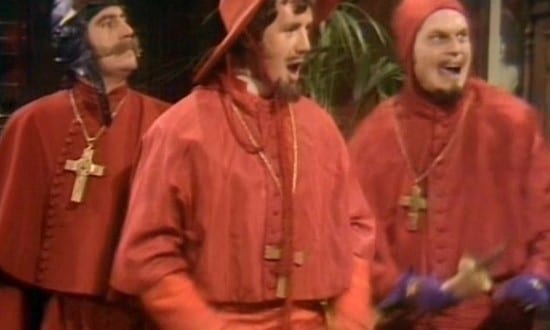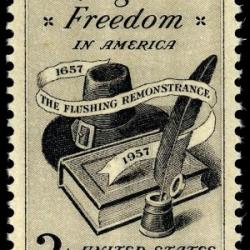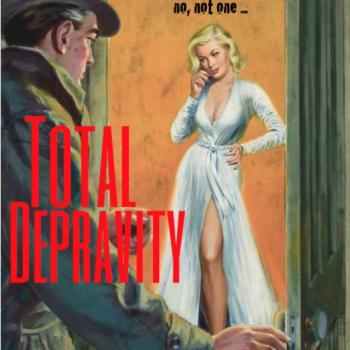Last month we revisited some very old theological debates in order to conclude that Keanu Reeves and Winona Ryder had not, in fact, accidentally gotten married on the set of the movie Dracula.
The two actors had stood in an actual church and recited the vows of the marriage ceremony before an actual, ordained priest who performed an actual and entire wedding ceremony precisely as he would have done for any couple actually receiving the sacrament of marriage. Yet despite that, no theologian or church authority holds that the two were in any way truly married that day. No one teaches that they received or became bound by the sacrament of marriage.

This isn’t because they used different names — the names of their characters in the film — instead of their actual names when reciting those vows. It’s entirely possible, after all, for two people to really get married without using their “real” names. The “reality” of their names (whatever that means — it’s more complicated than it may seem at first glance) isn’t the controlling and deciding factor. What mattered was their intent. Keanu and Winona were not standing together in that church before that priest with the intent of committing to one another in lifelong matrimony and receiving the sacrament of marriage. They were just two people doing their job, at work, telling a story. And because they did not intend to receive the sacrament or approach it sacramentally, they did not receive the sacrament and thus were not “accidentally married.” Intent is necessary.
As I said in that previous post, this gladdens my Baptist heart, because this necessity of intent is kind of our whole deal as Baptists, even if we’re not big on the sacramental language. This is one of those felicitous points of agreement with our Eastern Orthodox and Roman Catholic siblings who formally and officially believe, as we do, that it is not possible to get “accidentally” married.
They wouldn’t agree with our further insistence that it therefore also shouldn’t be possible to get accidentally baptized, but I suppose we can agree to disagree about that, for now, so long as they don’t resume deporting or drowning Baptists for making that case.
Yes, that was really a thing that used to happen. The early Baptists and Anabaptists ran afoul of the Inquisition (and also of the Reformation) due to their insistence that baptism, like every other sacrament, required the willing intent of its recipient. This was regarded as a form of rebellion not just against the authority of the church, but against the underlying synthesis of church and state and against the entanglement of spiritual and temporal power that enabled the Inquisition to share in the state’s monopoly on lethal violence.
As far as that goes, Baptists really were guilty as charged. The contention that one cannot be “accidentally” baptized does, in fact, demand and require the separation of church and state, which consequently became Baptists’ greatest gift to the world. (You’re welcome.)
While Baptists may not have persuaded the Inquisition to concede that we were right and they were wrong, we did at least force them to relinquish some of their nastier tools and to rebrand as a somewhat chastened “Congregation for the Doctrine of the Faith.”
That very same Inquisition, the C for the D of the F, is back in the news for reasons that have everything to do with the rambling discussion above. “Vatican causes chaos by invalidating baptism formula” Thomas Reese reports for Religion News Service:
For centuries, the baptismal formula in the Roman Catholic Church has been: “I baptize you in the name of the Father, and of the Son, and of the Holy Spirit.” Most Protestant churches have also used this formula.
Toward the end of the 20th century, however, a few baptismal ministers began tinkering with the formula. A few ministers have said “We baptize” to bring out the familial or community dimension of the baptism.
For example, a priest might say, “In the name of the father and of the mother, of the godfather and of the godmother, of the grandparents, of the family members, of the friends, in the name of the community we baptize you in the name of the Father and of the Son and of the Holy Spirit.”
In June the congregation, which deals with doctrinal issues, ruled that a baptism was invalid if the minister said, “We baptize” instead of “I baptize.…”
This caused absolute chaos in Detroit, where the Rev. Matthew Hood saw in a video of his 1990 baptism that Deacon Mark Springer used the “We” formula. As a result, Hood was not a Christian, let alone a priest, because he could not be validly ordained a priest if he was not validly baptized.
Hood’s situation was quickly remedied on Aug. 9 with his baptism and on Aug. 17 with his ordination. But the archdiocese is trying to track down everyone baptized by Deacon Springer, who served in Detroit from 1986 to 1999. How many other priests and deacons around the country used “We” is unknown.
But since his ordination in 2017 was invalid, people who went to Hood’s “Masses” did not really attend Mass and did not receive consecrated bread at Communion. It also means that his absolutions in confession were not sacramental. His confirmations and anointing of the sick were also invalid. When he performed these sacraments, he was not even a Christian, let alone a priest.
This is the kind of goofy nonsense you find yourself defending when you start imagining it’s your job, your right, or your prerogative to decide for somebody else whether or not they are or can be baptized. These arrogant bozos are lucky that St. Philip the Evangelist doesn’t reappear to dope-slap them silly (see Acts 8:37).*
What the Inquisitors are claiming here is that while it may be impossible to be “accidentally married,” it is entirely possible to be accidentally not married, accidentally not baptized, accidentally not ordained, not absolved, not forgiven, not saved.
What they’re arguing, in a sense, is that intent may be necessary, but it still amounts to nothing absent the recitation of the proper “formula.”
That ain’t liturgy. That’s spell-casting. And, as the story of poor Fr.-not-Fr. Hood demonstrates, it’s an approach that leads to perverse absurdities.
What if Matthew Hood had been hit by the Hypothetical Bus before that video had surfaced of the deacon fumbling the proper incantation at his baptism? He truly believed he was a Christian and a priest but, according to the Inquisitors, he would have been surprised to learn upon his death that he was damned to an eternity in Hell. “I’m terribly sorry,” God would inform him at the Pearly Gates, “but the deacon said ‘we’ — there’s nothing I can do about it.” That would be hilarious if it weren’t such a blasphemous slandering of God.
Our friends in the Inquisition are not alone in this literally magical thinking and confusion of religion with spell-casting. This is something my own Baptist and evangelical traditions stumble over in fretting about some required necessary proper formula for the “Sinner’s Prayer.” What if you didn’t say quite the right words in quite the right way with quite the right intent? Would that mean we, too, could be mistaken in our belief that we’re Christians? (See, again, Acts 8:37.*)
This twisted belief that makes salvation contingent on the semantics of spell-casting is the cause of great anxiety and insecurity. That’s why the church I grew up in ended almost every service with an altar call, even though the only audience for this altar call was the same 300 or so people who had been present for last week’s altar call, and the altar call of the week before that, the overwhelming majority of whom had already responded and gone forward in one or several more of the previous such altar calls in previous years.
This anxiety entails many costs, not the least of which is the simple emotional suffering it causes for all these people in that church or in Fr. Hood’s Detroit congregation. This salvation anxiety can wind up consuming most of the congregation’s energy and its capacity for doing or focusing on much of anything else.
And, as we said above, uncertainty about one’s Christian salvation entails a slanderous uncertainty about the character of God. To suggest that it is possible you’re not “really” a Christian despite your best attempts and best intentions to become one is to suggest that God is exactly like the kind of technicality-obsessed Inquisitor who would have consigned poor Fr. Hood to Hell because a deacon once used a first-person plural English pronoun instead of a first-person singular English pronoun.
Such uncertainty about the character of God, in turn, entails uncertainty about the desires of God — about what God wants and seeks for you, for the whole congregation, for the whole church, for the whole world.**
When we imagine a spell-casting religion designed to appease the semantic technicalities of an almighty Inquisitor, we wind up chasing the petty business of such a petty God. That can mean spending our lives devoted to a God who is not God, to a false god — to some God other than the One who brought us out of Egypt, out of the house of slavery.
And, ironically, that sort of thing really can put our salvation in jeopardy.
* Ha! Tricked you! There is no Acts 8:37, even though the eighth chapter of Acts has a verse 36 and a verse 38. Weird, right? Let’s take a look.
Philip the Evangelist is probably my favorite New Testament character. The book of Acts starts with Pentecost, with all of the disciples witnessing an undeniable, spectacular instance of explicit divine intervention and divine instruction, informing and commanding them that the gospel is to be shared expansively, inclusively, and universally. In response to this, the apostles and almost all of the rest of the early disciples hunker down for a period of solemn contemplation. But Philip is off and running.
First he makes a beeline for Samaria where, to the great consternation of the apostles, he starts baptizing absolutely everybody. The apostles were concerned about this because Samaria was infamously full of Samaritans and, well, you know … Samaritans. And while they agreed with Philip that Pentecost meant everybody-means-everybody, they were a bit unnerved that their newly hired deacon decided to start with a freaking Samaritan sorceror.
So the apostles are kind of playing catch-up, following Philip to Samaria to double-check his work, but by the time they get there he’s already long gone. He’s run off to some wilderness road to baptize a queer Black Gentile. That’s where we are with the whole Acts 8:36-38-but-not-37 business.
36 As they were going along the road, they came to some water; and the eunuch said, “Look, here is water! What is to prevent me from being baptized?”[h] 38 He commanded the chariot to stop, and both of them, Philip and the eunuch, went down into the water, and Philip baptized him.
See that footnote “[h]”? That would be verse 37, which was included in some old manuscripts, but not the earliest ones. It reads like this: “And Philip said, ‘If you believe with all your heart, you may.’ And he replied, ‘I believe that Jesus Christ is the Son of God.'”
So the queer Black Gentile says to Philip “What is to prevent me from being baptized?” and we’ve got two variations of what happens next, neither of which involves Philip reciting any of the many explicit scriptural prohibitions that would, in fact, seem to exclude a eunuch, Gentile, and servant of a pagan queen.
In the first version, Philip doesn’t say a word. He’s just, like, shrug-emoji, Pentecost, dude! and just baptizes the guy. In the second version, Philip says that “If you believe with all your heart,” then nothing can prevent you from being baptized, and then baptizes the guy.
Either way you choose to read this story, it seems to have extremely Baptist implications and doesn’t provide any support at all for the necessity of an official formula or incantation. (I suppose the C of the D of the F would claim that their later additions are legit because they’ve inherited the keys of St. Peter, but at this point Peter and his keys are still playing catch up back in Samaria, cleaning up after Philip’s Pentecost party at the sorceror’s house.)
By the way, apart from his starring role in the two stories in Acts 8, Philip only has bit parts in two other scenes in the Bible. They’re both pretty awesome too.
The first involves him getting chosen as one of “the seven” — the first people commissioned by the new community that would one day evolve into “the church.” That was — explicitly — an affirmative measure and a Reconstruction Amendment in which “the church,” right off the bat, had to hire seven Greek-speaking deacons to correct the systemic discrimination they were ashamed to realize was already infecting the church’s efforts to feed widows.
The second mention comes much later, after Acts has morphed into the Paul Show, and Paul’s journeys take him to Caesarea where he stays at Philip’s house and we learn that, oh, by the way, Philip “had four unmarried daughters who had the gift of prophecy.”
Everything about Philip — every detail of his story — reads like a bold-print version of the “social justice warrior” bogeyman that WhiteJesus followers fear and despise. Philip is just awesome.
** And what does God desire from you and for you? If only there were some simple, straightforward answer to that question.












